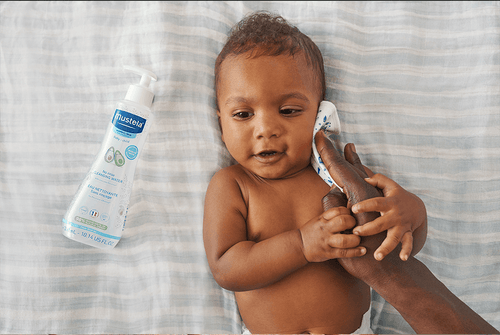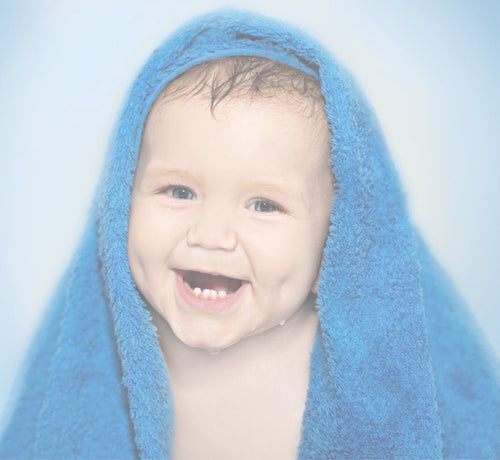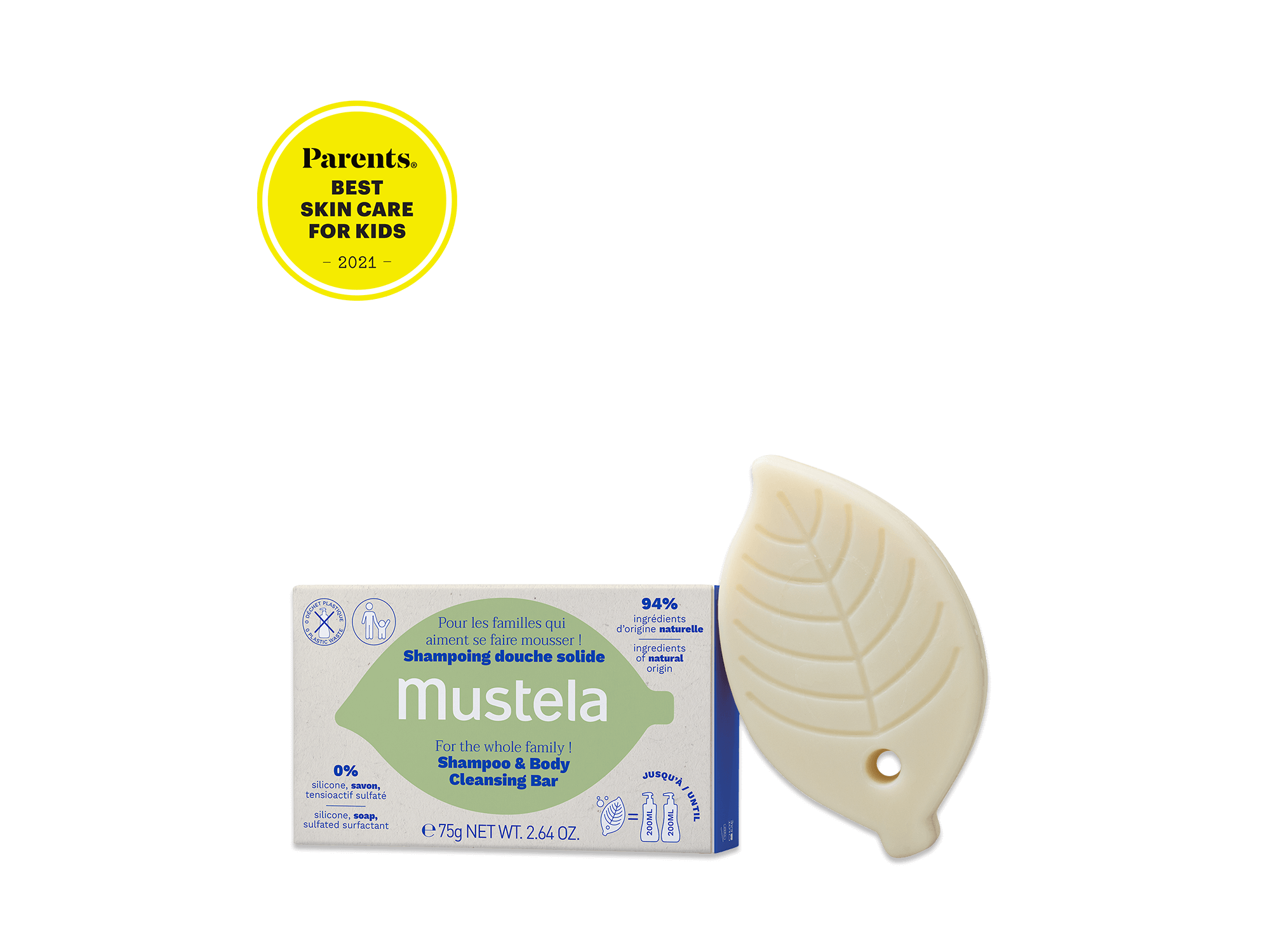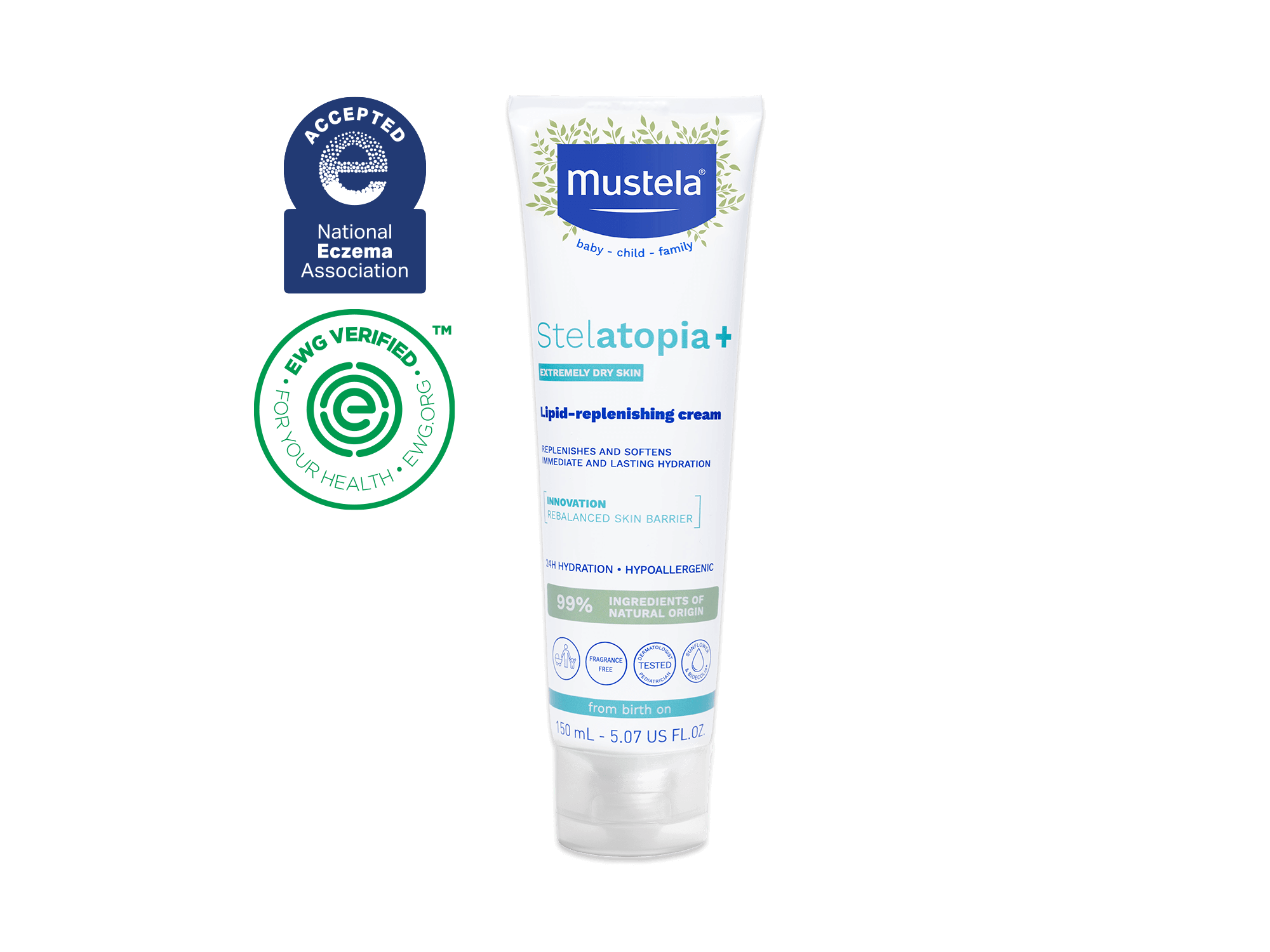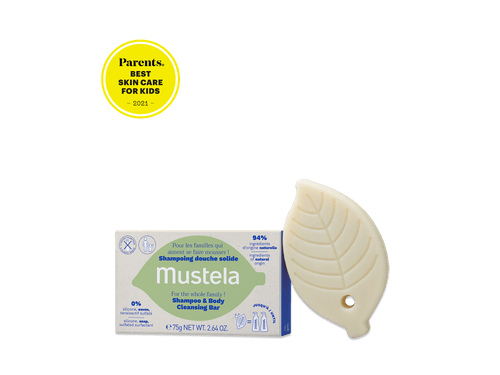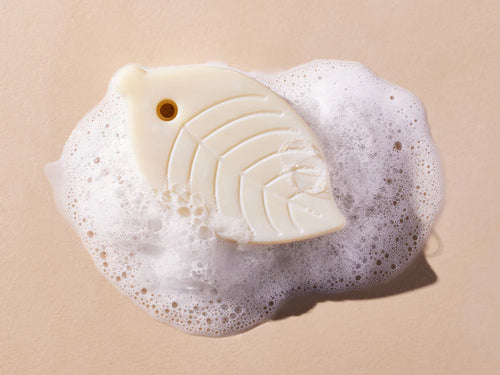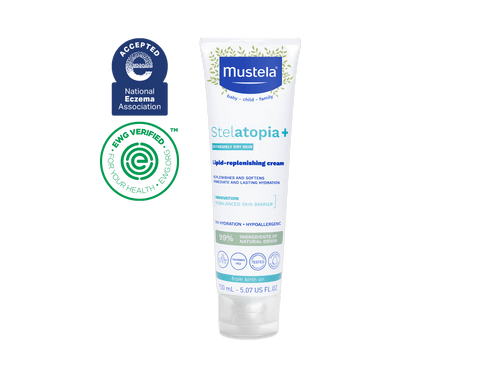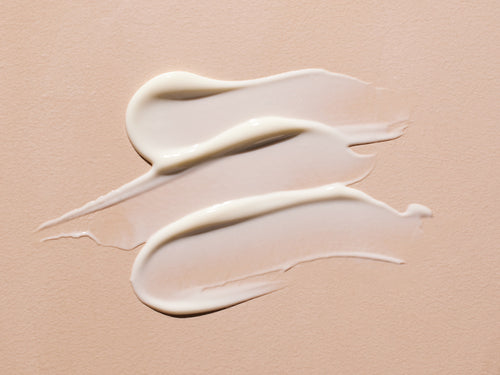There’s nothing quite like caressing your baby’s soft, delicate skin. Unfortunately, that amazingly delicate skin makes infants vulnerable to a number of skin conditions, like cradle cap, eczema, or even baby hives.
While it may be concerning to see hives on your child’s body, it’s usually nothing to worry about. Baby hives are not uncommon and often go away in a day or two. In this post, we’ll explain the causes and symptoms of your baby’s hives, as well as the best ways to treat this condition.

What Are The Symptoms Of Baby Hives?
Hives, officially known as urticaria, are relatively easy to identify. The one and only symptom to look for is, well, hives. You’ll recognize them because they look similar to mosquito bites—red or pink raised bumps, sometimes with a white-ish center.
Other symptoms of baby hives include:
- Swelling of the skin
- Itching
- Stinging or burning
Each hive can range in size from just one-fourth inch in diameter all the way up to three inches across. They may be in the shape of circles or ovals. Hives will often itch, but this isn’t always the case.

Generally speaking, hives last anywhere from several hours to several days. However, a baby’s hives can sometimes last a few weeks or, in very rare cases, a few months.
In these chronic cases, the hives may seem to appear, vanish, and reappear in the blink of an eye. If your baby shows these symptoms, head to your pediatrician’s office as soon as possible.
Most of the time, hives will appear on your baby’s torso, arms, and legs but can break out anywhere on your infant’s body. They tend to show up quickly.
One minute, your baby will seem completely fine. Then in as little as 20 or 30 minutes, your little one may have hives all over their body.
This can be alarming, but there’s no need to panic! Hives are an ordinary—and easily treatable—condition in newborns. Before we go over the best treatments for your baby’s hives, let’s take a look at the causes.
What Causes Baby Hives?

Hives form when your baby’s skin becomes irritated and releases a chemical called histamine. Histamine is a natural defense against external stimuli that are potentially harmful.
However, when histamine is released in large quantities, it settles in tiny pools just beneath the surface of your skin. These tiny pools of histamine are what’s giving your baby hives.
So, what causes your baby’s body to release all that histamine in the first place? Most often, it is the result of an allergic reaction. But there are many different irritants that your baby may be allergic to.
Let’s have a look at some of the most common irritants that can cause your baby to develop hives.
Insect Bites Or Bee Stings
This is a common cause of hives in both babies and adults. While things like mosquito bites and bee stings affect everyone, they can result in hives for babies who are even mildly allergic to insects or bees.
Plants
The cause of your baby’s hives could be something as simple as contact with a certain plant. It may be a harmful plant—like poison ivy or poison oak—or it may be an ordinary plant that caused an allergic reaction in your baby’s skin.
Infection
While hives are often the result of an allergic reaction, both viral infections and bacterial infections can also cause baby hives. If your baby’s hives are accompanied by a fever, diarrhea, and/or a little baby cold, then there’s a good chance your child has a viral or bacterial infection.
Always check in with your child’s doctor if you think they may have an infection.
A New Food
Perhaps the most common cause of hives in young children is an allergic reaction to a new food. Nuts, shellfish, eggs, and fruit are the most common allergy-inducing foods, but it’s possible to have an allergy to just about anything.
If you’ve recently introduced a new food into your baby’s diet, that may be the problem.
Skin Care Products

While almost all baby skin care products claim to be natural and safe for young children, many still contain chemicals or ingredients that can harm your baby’s delicate, easily-irritated skin.
This is why you’ll want to make sure that every single product you’re using on your baby is specially made with their safety and well-being in mind
Like Mustela products, which are specially formulated for delicate baby skin. Even better yet, Mustela offers everything your little one needs, including body wash, shampoos, lotions, wipes, and more.
Mustela also offers an organic collection that is ideal for sensitive skin!
Medication
Medications can sometimes cause a hives breakout. If your baby has taken a specific medicine for the first time in the last few days and now has a case of hives, one of the ingredients in that medicine is most likely the culprit.
Environmental Factors
Understandably, extremely cold or hot environments can cause baby hives, so changes in your child’s environment (i.e., going from hot to cold) could also trigger hives.
If you notice the heat or sun is irritating your baby’s skin, keep them out of the sun as much as possible. Or if cold air seems to bother your little one, use a humidifier inside your home.
Your Baby’s Nails
If your baby’s skin is irritated — like with baby hives — their first response is to scratch it. But scratching can sometimes make their hives even worse. Keeping your little one’s nails trimmed can help!
Other Irritants
There are several other irritants that may be causing your baby’s hives. A new laundry detergent or the fabric of a new item of clothing could be the problem.
Dirt, dust, and pet dander in your baby’s room might also be the cause. Consider all of these factors when trying to identify what gave your baby hives.
One clue to help you narrow down the culprit is knowing that hives tend to form within a few minutes to a few hours after your baby is exposed to the irritant.
When your little one gets hives, think back on the substances they’ve been exposed to over the last few minutes or hours. Or consider your baby’s environment and if anything changed, like the temperature.
If the hives keep occurring, start a running list of substances that your baby is encountering to give you an idea of what the underlying cause could be.
Unfortunately, because there are so many different things that can cause baby hives, you may never be able to find out what the culprit is! This sounds worrying, but it’s surprisingly common.
In fact, the AAP estimates that in over 30 percent of cases, it is not possible to determine the cause of a baby’s hives.

What Are The Best Treatments For My Baby’s Hives?
Most mild cases of baby hives will eventually go away on their own. But for those pesky hives that linger around and irritate your sweet baby, we have some options for you!
The best treatment for baby hives is to remove the irritant that caused the breakout in the first place. However, as mentioned above, this is often not possible. As such, other treatments must be used to heal your baby’s hives. Below are some easy treatment options.
Antihistamines
Remember at the beginning of the article when we mentioned that hives form after the body releases excessive amounts of a compound called histamine?
Well, that’s exactly why antihistamines are such an effective treatment for your baby’s hives. They dissipate the pools of histamine that have formed under the surface of your child’s skin.
The most well-known antihistamine is Benadryl. It is generally considered safe to give small doses of Benadryl to babies three months of age or older. The recommended dose is 1 milligram of Benadryl for every kilogram (2.2. pounds) that your baby weighs.
Remember, it’s always best to consult a doctor before giving your baby any medications, including ones that are deemed safe for infants.
Calamine Lotion
This soothing pink lotion will relieve any itching or discomfort that your bundle of joy may be experiencing. Although Calamine lotion won’t make the hives disappear, it will make your baby feel better in the meantime.
Loose, Comfy Clothing
Tight-fitting clothing can irritate your baby’s delicate skin. That’s why it’s best to dress your little one in loose clothes that won’t rub or inflame the hives. In addition, make sure that all of your baby’s clothing is made from gentle fabrics.
A Cool Compress
As a parent, you want your baby to be comfortable and free from any pain. Some symptoms of hives, as we mentioned above, include itching, stinging, or burning. That doesn’t sound very comfortable!
To relieve your little one’s discomfort, soak a washcloth in cool water and apply it directly to the hives for an easy at-home remedy!

Appropriate Skin Care Products
Using natural skin care products is essential. Mustela offers a wide variety of products that are safe for babies, children, and even the whole family!
Specifically, we recommend using Mustela’s Stelatopia Emollient Balm or Stelatopia Emollient Face Cream to help repair your little one’s irritated skin and give effective relief from the discomfort of hives.
Enriched with a blend of ingredients of natural origin per ISO 16128 standard, its fragrance-free formula is free of parabens, phthalates, and phenoxyethanol. This means it won’t irritate your baby’s hives but, instead, help relieve their skin!
Additionally, our Very Sensitive Skin products are perfect for your little one’s reactive skin.
This line offers a fragrance-free range of products made with ingredients of natural origin per ISO 16128 standard for cleansing, moisturizing, and bathing your baby to reduce redness and relieve sensations of tingling and tightness.
Part of our Very Sensitive line, our Soothing Cleansing Gel safely and effectively cleans your baby's hair and body while also working to soothe their skin.
Of course, after you wash your baby with our Soothing Cleansing Gel, you’ll need to follow-up with our Soothing Moisturizing Body Lotion. But you don’t have to use it just after bath time!
Mustela’s Soothing Moisturizing Body Lotion is a daily baby body lotion that protects and relieves your baby's sensitive and reactive skin. It delivers immediate and long-lasting moisture, just what your baby needs to help soothe their hives!
And don’t forget about our Certified Organic Water Wipes with Cotton and Aloe to clean your baby's face, body, and diaper area! These ultra-soft, fragrance-free baby wipes are specially formulated for babies and children with very sensitive, rashy, or reactive skin.
After using these wipes at home or on-the-go, your baby’s skin will feel soft and hydrated. What’s more, they also provide relief for your little one’s irritated skin!
Hugs And Kisses

This won’t make your baby’s hives disappear, but it will definitely help your little bundle of joy feel more comfortable! Shower your little one with extra hugs and kisses until the hives have gone away.
Just one final note about treating your baby’s hives: it’s best to treat hives immediately, as they are often caused by an allergic reaction.
Allergic reactions can potentially get worse very quickly, so don’t wait to see if the hives will go away on their own. Begin treating your baby’s hives as soon as you notice them!
When Should I Take My Baby To The Doctor?
While baby hives is normally not a condition that requires a trip to the doctor’s office, there are some cases that do. Head to the hospital immediately if your baby shows any of the following symptoms:
- Wheezing or difficulty breathing
- Persistent vomiting
- Lightheadedness, dizziness, or fainting
- Hives that last more than a few days
Severe allergic reactions, such as anaphylactic shock, are very serious and can be life-threatening in extreme cases. If you see any of the signs above, head to the hospital ASAP.
Taking Care Of Your Baby’s Skin

With that said, it’s worth repeating that baby hives is a completely normal condition. Medical professionals estimate that as many as 20 percent of babies will develop a case of hives at some point in their childhood.
So, if you’re infant is one of those who do develop a case of baby hives, they’re not alone! Use the easy treatments we’ve outlined in this article, and keep your baby occupied with lots of TLC from Mom and Dad, and choose gentle skin care products.
Your little bundle of joy will be back to normal in no time!

